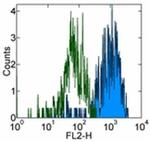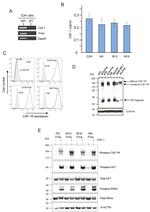Search Thermo Fisher Scientific
Invitrogen
CD115 (c-fms) Monoclonal Antibody (12-3A3-1B10), eBioscience™
FIGURE: 1 / 2
CD115 (c-fms) Antibody (14-1159-82) in Flow


Product Details
14-1159-82
Species Reactivity
Published species
Host/Isotype
Class
Type
Clone
Conjugate
Form
Concentration
Purification
Storage buffer
Contains
Storage conditions
Shipping conditions
RRID
Product Specific Information
Description: CD115 or Colony-Stimulating Factor-1 Receptor (CSF-1R) is expressed on cells committed to the monocyte lineage and osteoclasts. CSF-1R is a disulfide-linked homodimer, which upon binding of its ligand, CSF-1, undergoes tyrosine autophosphorylation and subsequently, phosphorylates other membrane-proximal downstream targets which results in cytoskeletal remodeling, gene transcription and protein translation. CSF-1R activation promotes the survival, proliferation and differentiation of mononuclear phagocytes and the spreading and motility of macrophages. In osteoclasts, CSF-1R synergizes with RANKL to regulate the differentiation of mononuclear phagocytes to osteoclasts.
Applications Reported: This 12-3A3-1B10 antibody has been reported for use in flow cytometric analysis, immunoprecipitation, immunoblotting (WB), and immunohistochemical staining.
Applications Tested: This 12-3A3-1B10 antibody has been tested by flow cytometric analysis of normal human peripheral blood cells. This can be used at less than or equal to 1 µg per test. A test is defined as the amount (µg) of antibody that will stain a cell sample in a final volume of 100 µL. Cell number should be determined empirically but can range from 10^5 to 10^8 cells/test. It is recommended that the antibody be carefully titrated for optimal performance in the assay of interest.
Purity: Greater than 90%, as determined by SDS-PAGE.
Aggregation: Less than 10%, as determined by HPLC.
Filtration: 0.2 µm post-manufacturing filtered.
Target Information
CSF1R (FMS) is involved in the production, differentiation, and function of macrophages, and is implicated in promyelocytic leukemias. Ligand binding activates the receptor kinase through a process of oligomerization and transphosphorylation. CSF1R is a tyrosine kinase transmembrane receptor and member of the CSF1/PDGF receptor family of tyrosine-protein kinases. Mutations in the gene encoding CSF1R have been associated with a predisposition to myeloid malignancy.Tyrosine-protein kinase that acts as cell-surface receptor for CSF1 and IL34 and plays an essential role in the regulation of survival, proliferation and differentiation of hematopoietic precursor cells, especially mononuclear phagocytes, such as macrophages and monocytes. Promotes the release of proinflammatory chemokines in response to IL34 and CSF1, and plays an important role in innate immunity and in inflammatory processes. The first intron of the CSF1R gene contains a transcriptionally inactive ribosomal protein L7 processed pseudogene oriented in the opposite direction. Mutations in the CSF1R gene have been associated with a predisposition to myeloid malignancy.
For Research Use Only. Not for use in diagnostic procedures. Not for resale without express authorization.
Bioinformatics
Protein Aliases: CD115; CD115 antigen; CSF-1 receptor; CSF-1-R; CSFIR; EC 2.7.10.1; FMS proto-oncogene; kinase CSFR; macrophage colony stimulating factor I receptor; Macrophage colony-stimulating factor 1 receptor; McDonough feline sarcoma viral (v-fms) oncogene homolog; OTTHUMP00000224093; Proto-oncogene c-Fms
Gene Aliases: C-FMS; CD115; CSF-1R; CSF1R; CSFR; FIM2; FMS; HDLS; M-CSF-R
UniProt ID: (Human) P07333
Entrez Gene ID: (Human) 1436

Performance Guarantee
If an Invitrogen™ antibody doesn't perform as described on our website or datasheet,we'll replace the product at no cost to you, or provide you with a credit for a future purchase.*
Learn more
We're here to help
Get expert recommendations for common problems or connect directly with an on staff expert for technical assistance related to applications, equipment and general product use.
Contact tech support
